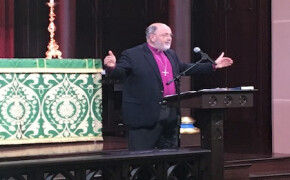N.T. Wright Addresses Dallas Clergy

N.T. Wright, quondam Bishop of Durham in the Church of England, and world-renowned scripture scholar, addressed a gathering of the clergy of the Episcopal Diocese of Dallas on Tuesday at the Church of the Incarnation in Dallas. Wright expounded on themes from his 2016 book, The Day the Revolution Began.
Wright set his remarks within the context of the foot-washing narrative from John 13, referring to the event as “fraught with cosmic significance,” an iconic fulfillment of Old Testament prophecy, and one pointing to the suffering of the cross that would take place the following day. There on the cross, said Wright, the world would see “the Word made flesh, the flesh made shameful, and the shame made dead.”
Wright wove into his address a critique of theological abstraction, noting that “Jesus didn’t give his disciples a theory – he gave them a meal.” Wright described the history of the cosmos, of Israel, and of the Church, as interpenetrating and overlapping narratives that find their fulfillment in the incarnation of Christ. Hence, Wright noted, when Jesus cries out “It is finished!” on the cross, it is a word about the consummation of God’s intention from Genesis 1. It is, in a sense, the fulfillment of the purpose for which God created the universe.
In saying this, Wright critiqued what he seemed to regard as facile theories of the atonement, especially targeting theories having to do with penal substitution. Wright noted that such theories would appear to reverse the message of John 3:16 – instead of showing God loving the world so much that he sent his only Son, they suggest that “God hated the world so much that he killed his only Son.” Wright encouraged the gathered clergy to look to the gospels themselves, rather than writings about the gospels, for clues as to the meaning of the cross. “The gospels,” he said, “tell you what it means, not just how it happened.”
Wright drew on themes from his earlier writings about the new creation inaugurated by the bodily resurrection of Jesus, suggesting that Christian hope must remain grounded in this confession. The evangelical compulsion of the witness of early Christians was not, he said, in convincing rhetoric. It was rather to be found in Christians showing their pagan neighbors what Wright called “a new way of being human.”
Wright concluded with an exhortation to the gathered clergy to continue this witness, and to expect opposition when it is done right, even as Jesus’ ministry, he said, elicited opposition “like a magnet” from the cosmic forces opposing God’s rule. He encouraged the clergy to draw strength from the Eucharist, reminding them that every Eucharist is “a proclamation of Christ’s death and resurrection to the principalities and powers of the world.” Wright quoted Paul’s words to the Colossians, reminding them of “this mystery, which is Christ in you, the hope of glory.” “The disciples of Jesus,” he said, “do not comprise a religion, but a new kind of city,” one in which the “strong and humble sovereignty” of God accompanies his people, fulfilling God’s purpose for the whole cosmos.
The Rev. Will Brown is rector of Holy Cross in Dallas.

